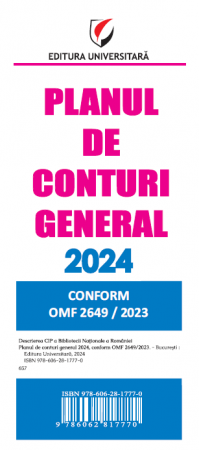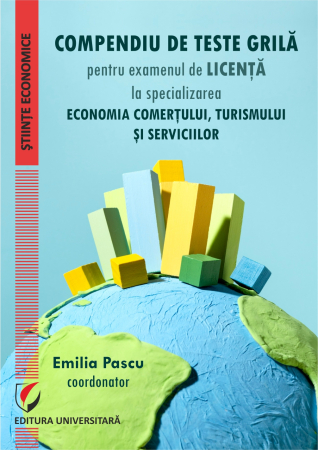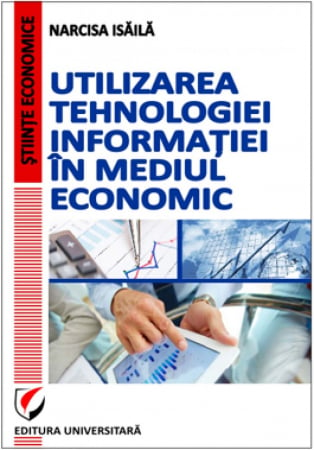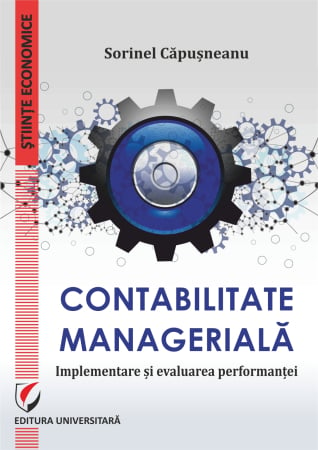ISBN: 978-973-749-572-3
Publisher year: 2010
Edition: I
Pages: 232
Publisher: Editura Universitară
Author: Vasilica Voicu
- Description
- Download (1)
- Authors
- Reviews (0)
The economy today is characterized by a substantial increase competition between businesses. To meet this competition fierce, managers must take the right strategic decisions based on real information. The success of firms in a competitive business environment depends largely on the quality of information they use in running their business processes. Managers want an accurate and current information, provides real-time, in an appropriate format and at an affordable price. Thus, information becomes a crucial factor of production. The factors leading to this situation are: increasing complexity of the structure of enterprises, relations between firms, creating new business processes, redirecting existing business processes to the customer, globalization of markets, customers and businesses and new technologies such as Internet or electronic commerce.
In the current evolution of the economy and society in general, issues of decision making becomes more complicated. Managers faced with an avalanche of information, data, knowledge in an environment increasingly crowded, both in terms of their organization, but especially in terms of market of potential customers and competition. In this context, the need for a system for organizing data, the extraction of useful information and knowledge and relevant to their presentation in a format specific synthetic and top management is obvious.
Doing business is not held high-level studying reports presenting large volumes of data, detailed daily and without correlation. Current environment, the fraction of the time evolution of an organization may decide, requires a powerful system in which data is presented directly, promptly, synthetically relevant, prediction and advanced analysis capabilities. Such a system should allow the executive manager ever to see and analyze the situation of their organization so that decisions are based. For example, the decision of the medium and long term investment can be substantiated by analysis of a report on the cash flow situation in the coming months, report to the manager through a portal, accessible from anywhere using mobile devices, being conditioned by the existence of systems cumbersome analysis, reporting and data presentation.
Current information systems are mostly transactional processing systems on-line (on-line Transaction Processing / OLTP) dealing with one dimension of the data - this. In every organization there are many transactional systems that automate daily operations of an organization that is structured and repetitive operations and transactions consist of short, atomic and isolated. These systems allow management of the organization and use of detail data, current and real-time representation of the state company, accessed and updated frequently.
Operational database size in MB to GB range and consistency of stored data is a fundamental requirement of transactional systems.
Decision support systems - SSD - (English "Decision Support Systems") is a specific class of systems designed to help knowledge workers, decision-making at different positions in solving problems encountered that matter for welfare organization. Help they receive makers, whether top executives, managers place on various levels, counselors and other decision support, is, first, to support them to overcome the limits of knowledge regarding the problem, possible alternatives action, methods of analysis used in the election.
Unlike transactional systems, decision support systems (DSS) are used to manage and control the company. Historical data and aggregated data are more important than detailed data. Applications can access ad-hoc million records and running a lot of completion of data collection. To facilitate analysis and complex views, data must be modeled and viewed differently. Also, decision support systems can use data that are not in operational databases (for example, making predictions is required historical data, while operational databases store only current data). Data can come from various sources: heterogeneous operating systems (systems database management, file management systems) and other external data sources (demographic and statistical databases, Internet).
In conclusion, the main objectives of the XXI century SSDs are quick access and fast calculations, strong analytical facilities, user-friendly and flexible presentation, processing large volumes of data (historical, current and planned, detailed or aggregated), the environment multiuser decentralized.
The course has as main objectives:
- familiar with the development and use of systems to assist in specific decisions;
- familiarity with systems to assist executive;
- familiarity with collaborative systems and group decision in the new economy;
- use instruments for decision making;
- approach and skills to achieve learning applications for small and medium businesses;
- analysis and interpretation of quantitative and qualitative data and information on successful solutions and systems to assist decision failures.
-
Sisteme suport pentru adoptarea deciziei
Download

6359.png)
![Decision support systems [1] Decision support systems [1]](https://gomagcdn.ro/domains/editurauniversitara.ro/files/product/large/sisteme-suport-pentru-adoptarea-deciziei-1861-904148.jpg)














